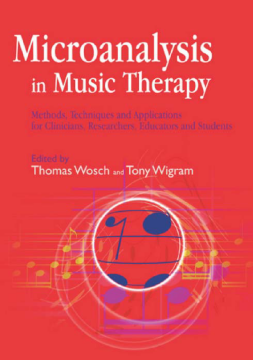
Additional Information
Book Details
Abstract
In the context of music therapy, microanalysis is the detailed analysis of that short period of time during a music therapy session during which some kind of significant change takes place. These moments are crucial to the therapeutic process, and there is increasing interest amongst music therapists in understanding how they come about and whether there are ways of initiating them.
The contributors to this groundbreaking book look at methods of micro process analyses used in a variety of music therapy contexts, both clinical and research-based. They outline their methods, which include using video and audio materials, interviewing, and monitoring the client's heart rate, and also give examples of the practical application of microanalysis from their clinical experience, including work with clients who have psychiatric illness, autism and other conditions.
Microanalyses in Music Therapy provides a wealth of important theoretical and practical information for music therapy clinicians, educators and students.
Microanalysis in Music Therapy provides ample evidence of the science and technology behind music therapy, and helps to bust the myth that music therapy means having a sing-along with your patients. Microanalysis in this context refers to the detailed analysis of events in music therapy sessions using verbal, musical and/or video data that can then be used to explore and document significant changes that occur in the process of therapy. Each chapter introduces a model or technique for studying one or more processes in music therapy and a context for its application. The applications range widely from developmental disorders, brain injuries and mental health in children and adults, to tools for assessment and education of trainee music therapists. The book is directed at practising music therapists, researchers, educators and students however, I think school music teachers, researchers and health professionals from a range of disciplines will find much of interest here as well.
Drug and Alcohol Review
There is clarity from each author's contribution that inspires the reader not only to want to look further but also to use and adapt their individual thinking in practice. Wosch and Wigram have provided us with a clear and useful text that will be invaluable for practising music therapists, researchers, educators and students.
British Journal of Music Therapy
Table of Contents
| Section Title | Page | Action | Price |
|---|---|---|---|
| Editorial | |||
| Caroline Sweetman | |||
| Liberalisation, gender, and the land question in Sub-Saharan Africa | |||
| Kaori Izumi | |||
| Does land ownership make a difference? Women's roles in agriculture in Kerala,India | |||
| Shoba Arun | |||
| Rural development in Brazil: Are we practising feminism or gender? | |||
| Cecilia Sardenberg, Ana Alice Costa, and Elizete Passos | |||
| Women farmers and economic change in northern Ghana | |||
| Rachel Naylor | |||
| 'Lazy men', time-use, and rural development in Zambia | |||
| Ann Whitehead | |||
| Intergrating gender needs into drinking water projects in Nepal | |||
| Shibesh Chandra Regmi and Ben Fawcett | |||
| Structural adjustment, women, and agriculture in Cameroon | |||
| Charles Fonchingong | |||
| Interview with Penny Fowler and Koos Neefjes of Oxfam GB:Are genetically modified foods a new development? | |||
| Resources | |||
| compiled by Erin Murphy Graham | |||
| Books and Papers | |||
| Organisations | |||
| Web Resources | |||
| E-mail lists | |||
| Index to Volume. |
